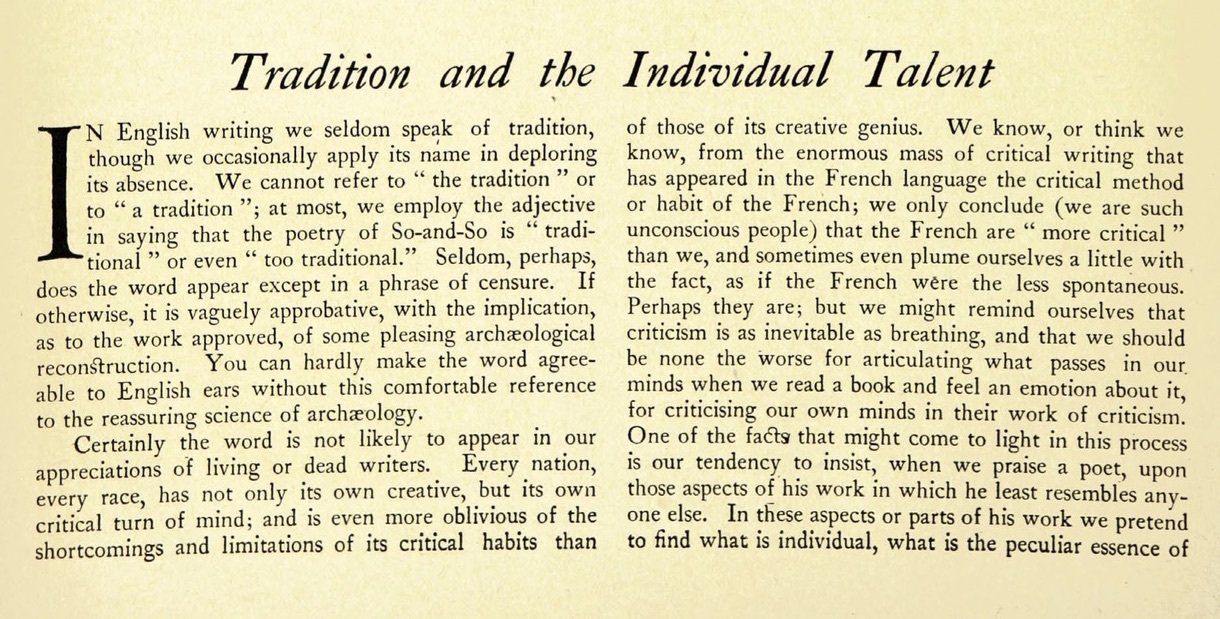IN ENGLISH
writing we seldom speak of tradition, though we occasionally apply its name in deploring its absence. We cannot refer to “the tradition” or to “a tradition”; at most, we employ the adjective in saying that the poetry of So-and-so is “traditional” or even “too traditional.” Seldom, perhaps, does the word appear except in a phrase of censure. If otherwise, it is vaguely approbative, with the implication, as to the work approved, of some pleasing archaeological reconstruction. You can hardly make the word agreeable to English ears without this comfortable reference to the reassuring science of archaeology.
Certainly the word is not likely to appear in our appreciations of living or dead writers. . . . One of the facts that might come to light in this process [criticism] is our tendency to insist, when we praise a poet, upon those aspects of his work in which he least resembles anyone else. In these aspects or parts of his work we pretend to find what is individual, what is the peculiar essence of the man. We dwell with satisfaction upon the poet’s difference from his predecessors, especially his immediate predecessors; we endeavor to find something that can be isolated in order to be enjoyed. Whereas if we approach a poet without his prejudice we shall often find that not only the best, but the most individual parts of his work may be those in which the dead poets, his ancestors, assert their immortality most vigorously. And I do not mean the impressionable period of adolescence, but the period of full maturity.
Yet if the only form of tradition, of handing down, consisted in following the ways of the immediate generation before us in a blind or timid adherence to its successes, "tradition" should positively be discouraged. We have seen many such simple currents soon lost in the sand; and novelty is better than repetition. Tradition is a matter of much wider significance. It cannot be inherited, and if you want it you must obtain it by great labour. It involves, in the first place, the historical sense, which we may call nearly indispensable to anyone who would continue to be a poet beyond his twenty-fifth year; and the historical sense involves a perception, not only of the pastness of the past, but of its presence; the historical sense compels a man to write not merely with his own generation in his bones, but with a feeling that the whole of the literature of his own country has a simultaneous existence and composes a simultaneous order. This historical sense, which is a sense of the timeless as well as of the temporal and of the timeless and of the temporal together, is what makes a writer traditional. And it is at the same time what makes a writer most acutely conscious of his place in time, of his contemporaneity. [...]
No poet, no artist of any art, has his complete meaning alone. His significance, his appreciation is the appreciation of his relation to the dead poets and artists. You cannot value him alone; you must set him, for contrast and comparison, among the dead. . . .
Some one said: “The dead writers are remote from us because we know so much more than they did.” Precisely, and they are that which we know. [...]
Some can absorb knowledge, the more tardy must sweat for it. Shakespeare acquired more essential history from Plutarch than most men could from the whole British Museum. What is to be insisted upon is that the poet must develop or procure the consciousness of the past and that he should continue to develop this consciousness throughout his career.
*From The Sacred Wood and Major Early Essays
(Mineola, NY: Dover Publications, Inc., 1998), 27-33.










